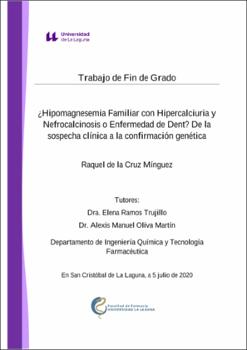¿Hipomagnesemia familiar con hipercalciuria y nefrocalcinosis o enfermedad de Dent? : de la sospecha clínica a la confirmación genética
Author
Cruz Mínguez, Raquel de laDate
2020Abstract
Dent's disease and Familial Hypomagnesaemia with Hypercalciuria and
Nephrocalcinosis (FHHN) are inherited diseases with hypercalciuria, nephrocalcinosis and
renal failure, whose defects are located in the proximal tubule and thick ascending limb of
Henle’s loop, respectively.
In this work, existing information on Dent's disease and FHHN is compiled to justify
the need to analyze the causal genes of Dent's disease when genetic confirmation is not
achieved in cases where there is clinical suspicion of FHHN. Due to the great genetic
heterogeneity, the lack of genotype-phenotype correlation, as well as the overlap of some of
the clinical symptoms and biochemical manifestations, the diagnosis of these tubulopathies
is complicated; for this reason, the analysis of the CLCN5 and OCRL genes could be of
interest for the diagnosis of Dent's disease in these cases, since they would be atypical
manifestations of this pathology not described so far. La enfermedad de Dent y la Hipomagnesemia Familiar con Hipercalciuria y
Nefrocalcinosis (HFHN) son enfermedades hereditarias que cursan con hipercalciuria,
nefrocalcinosis y fallo renal, y cuyos defectos se localizan en el túbulo proximal y en la rama
ascendente del asa de Henle, respectivamente.
En este trabajo se analiza la información existente sobre la enfermedad de Dent y la
HFHN para justificar la necesidad de analizar los genes causales de la enfermedad de Dent
cuando no se consigue confirmación genética en casos en los que existe sospecha clínica de
HFHN. Debido a la gran heterogeneidad genética, la no correlación genotipo-fenotipo, así
como el solapamiento de algunos de los síntomas clínicos y manifestaciones bioquímicas, el
diagnóstico de estas tubulopatías es complicado; por este motivo, el análisis de los genes
CLCN5 y OCRL podría ser de interés para el diagnóstico de la enfermedad de Dent en estos
casos, ya que se trataría de manifestaciones atípicas de esta patología no descritas hasta el
momento.





